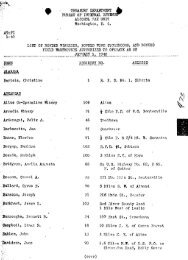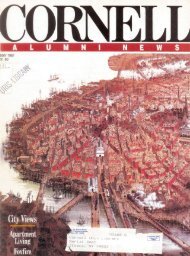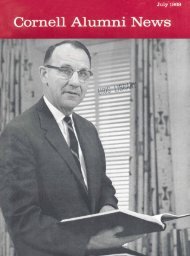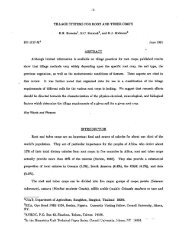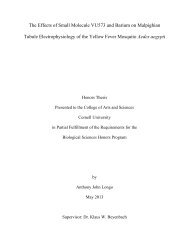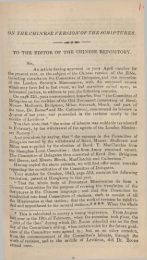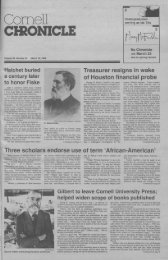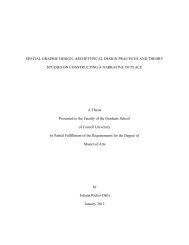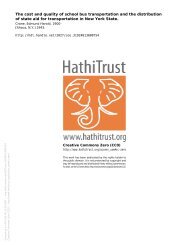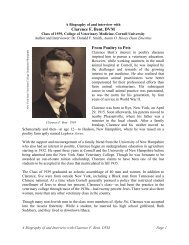1/1 - eCommons@Cornell - Cornell University
1/1 - eCommons@Cornell - Cornell University
1/1 - eCommons@Cornell - Cornell University
- No tags were found...
Create successful ePaper yourself
Turn your PDF publications into a flip-book with our unique Google optimized e-Paper software.
drank beer in a crowded disco.<br />
Culture is a means of survival, hope,<br />
normality. Young men alternate between<br />
fighting at the front and pursuing<br />
their studies in tutorial sessions<br />
with professors, reading by the light of<br />
a single candle during the 15-hour winter<br />
nights.<br />
We distributed most of our 240<br />
pounds of provisions to students who<br />
appeared particularly undernourished.<br />
Pero, for instance, whose family had no<br />
resources, hadn't eaten anything resembling<br />
a meal for over a week.<br />
As four of us walked in the city,<br />
a tiny red flare floated soundlessly<br />
over our heads. I didn't<br />
realize the danger until the others<br />
pulled me toward the building.<br />
It had been meant for us. Crossing<br />
the bridge at night on the way<br />
home, another silent floating red flare<br />
missed its mark.<br />
Everyone had lost touch with members<br />
of their family, had been through<br />
the agony of death or injury to someone<br />
close. Scarred by the war, young<br />
people seemed too old for their years.<br />
Vibrant, elegant, sophisticated Gordana<br />
was the life of a New Year's Eve<br />
party. "We never took notice of nationality,"<br />
she said. "We were Yugoslavs<br />
from Bosnia. I can't call myself<br />
Serb or Moslem or Croat. My grandparents<br />
were Serb and Croat. My<br />
mother is Moslem. I don't want to be a<br />
refugee. I am Bosnian and Catholic.<br />
Bosnian Moslems who practice their<br />
religion are Bosnian," she said. She<br />
talked about her 11-year-old brother's<br />
injury, the shock of sitting in a car next<br />
to the driver when the man's skull was<br />
blown to bits.<br />
Christmas weekend had been<br />
peaceful as was the Monday when Ilja,<br />
a champion skier and physics student,<br />
proposed a tour of the city. We were<br />
looking at displays of food and drink<br />
being sold in the central market, "special"<br />
for the coming New Year festivities<br />
(low-grade meat $16 per pound,<br />
bone included), then converting the<br />
price of an unknown brand of Scotch<br />
from German marks into dollars ($76)<br />
when an explosion sent everyone<br />
shrinking into corners. Stalls emptied<br />
instantly.<br />
The shell seemed to have hit just<br />
outside the 16th century stone market.<br />
The tour was over, as was the holiday<br />
truce which had lasted three days. Daily<br />
he library was<br />
now an empty,<br />
faceless<br />
shell... As it<br />
burned, snipers<br />
shot at those<br />
who tried to<br />
save rare<br />
manuscripts<br />
and books. All<br />
that was left<br />
were traces of<br />
exquisitely M<br />
carved marble<br />
pillars, mosaics,<br />
frescos, a<br />
few burned<br />
pages of books.<br />
bombardment became the rule. Was<br />
that noise a truck skidding, carts being<br />
pulled to fetch water, a shell on its trajectory?<br />
No house or building, no street or<br />
neighborhood was safe. There was no<br />
escape, either, from the climate of fear,<br />
the constant strain, the perpetual sense<br />
of insecurity.<br />
Sarajevo stretches out for ten miles,<br />
like fingers in valleys, surrounded by<br />
hills. In Sarajevo's Olympic mountains<br />
Serb irregulars from the countryside<br />
and the Yugoslav People's Army, with<br />
its heavy artillery, bombard the city.<br />
Shells rain down from the mountains;<br />
snipers fire rifles. You are always in<br />
range of guns.<br />
The day before the New Year, a day<br />
of reprieve, we set off through the ruins<br />
from one scene of devastation to<br />
another, through shattered streets of<br />
burned-out buildings where gaping<br />
holes had once been windows, past tree<br />
roots and blasted walls. Ilja pointed out<br />
the remnants of sculptures on cracked,<br />
pock-marked facades. The post office<br />
had burned for six days while snipers<br />
turned their guns on the fire fighters.<br />
The library was now an empty,<br />
faceless shell. An Austro-Hungarian<br />
edifice and the pride of Sarajevo, it had<br />
been one of the largest in Central Europe.<br />
As it burned, snipers shot at those<br />
who tried to save rare manuscripts and<br />
books. All that was left were traces of<br />
exquisitely carved marble pillars, mosaics,<br />
frescos, a few burned pages of<br />
books.<br />
After a last look at a statue of the<br />
Pieta at the gate of a seminary, a shell<br />
exploded nearby like a thunderbolt.<br />
Smoke trailed into the sky. One after<br />
another, shells fell from one end of the<br />
city to the other. We ran along empty<br />
streets. We ran through the center of<br />
town, past a heap of debris and a huge<br />
bloodstain on the main street.<br />
The following day I lost my nerve.<br />
We flew out on a British military plane,<br />
one that carries rations into the city.<br />
Departure brought relief and shame. By<br />
leaving I had somehow failed the people<br />
of the city. A voice from Sarajevo cries<br />
out in despair, "Send us coffins, not humanitarian<br />
aid, for you have condemned<br />
us to death."<br />
In March 1994, Elinore Schaffer returned<br />
to Sarajevo.



